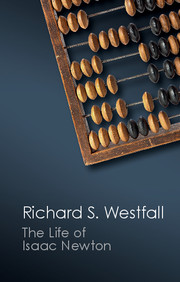Book contents
- Frontmatter
- Dedication
- Contents
- Preface
- Acknowledgments
- A Note About Dates
- Plates
- 1 A Sober, Silent, Thinking Lad
- 2 The Solitary Scholar
- 3 Anni Mirabiles
- 4 Lucasian Professor
- 5 Publication and Crisis
- 6 Rebellion
- 7 Years of Silence
- 8 Principia
- 9 Revolution
- 10 The Mint
- 11 President of the Royal Society
- 12 The Priority Dispute
- 13 Years of Decline
- Bibliographical Essay
- Index
- Frontmatter
- Dedication
- Contents
- Preface
- Acknowledgments
- A Note About Dates
- Plates
- 1 A Sober, Silent, Thinking Lad
- 2 The Solitary Scholar
- 3 Anni Mirabiles
- 4 Lucasian Professor
- 5 Publication and Crisis
- 6 Rebellion
- 7 Years of Silence
- 8 Principia
- 9 Revolution
- 10 The Mint
- 11 President of the Royal Society
- 12 The Priority Dispute
- 13 Years of Decline
- Bibliographical Essay
- Index
Summary
NEWTON was hardly an unknown man in philosophic circles before 1687. The very extent to which he had made his capacity in physics and mathematics known had functioned in the early 1680s to destroy his attempt to reconstruct an isolation in which he might pursue his own interests in his own way. Nevertheless, nothing had prepared the world of natural philosophy for the Principia. The growing astonishment of Edmond Halley as he read successive versions of the work repeated itself innumerable times in single installments. Almost from the moment of its publication, even those who refused to accept its central concept of action at a distance recognized the Principia as an epoch-making book. A turning point for Newton, who, after twenty years of abandoned investigations, had finally followed an undertaking to completion, the Principia also became a turning point for natural philosophy. It was impossible that Newton's life could return to its former course.
Rumors of the coming masterpiece had flowed through Britain during the first half of 1687. For those who had not heard, a long review in the Philosophical Transactions announced the Principia shortly before publication. Although the review was unsigned, we know that Halley wrote it. With the exception of Newton himself, no one knew the contents of the work better. He insisted on its epochal significance.
This incomparable Author [the review began] having at length been prevailed upon to appear in publick, has in this Treatise given a most notable instance of the extent of the powers of the Mind; and has at once shewn what are the Principles of Natural Philosophy, and so far derived from them their consequences, that he seems to have exhausted his Argument, and left little to be done by those that shall succeed him.
After the body of the review presented a summary of the Principia, Halley closed with a further encomium: “[I]t may be justly said, that so many and so Valuable Philosophical Truths, as are herein discovered and put past Dispute, were never yet owing to the Capacity and Industry of any one Man.”
In mathematical circles, such as the one gathered around David Gregory in Scotland, the fame and influence of thePrincipia spread quickly. Across the Channel, a political refugee, John Locke, set himself to mastering the book. Because he was not a mathematician, he found the demonstrations impenetrable.
- Type
- Chapter
- Information
- The Life of Isaac Newton , pp. 191 - 220Publisher: Cambridge University PressPrint publication year: 2015

